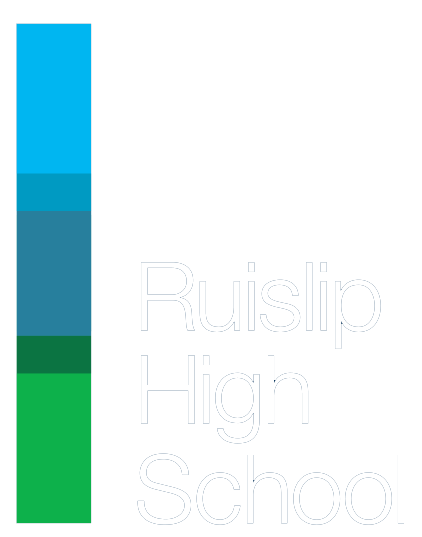Music
Music lessons at Ruislip HIgh School provide an opportunity for all students to experience what it is like to be a musician. The Music curriculum is broadly focused on three elements: composing, performing and listening, and appraising music.
Key Stage 3
Throughout the key stage students gain the confidence and skills to compose music from a variety of genres and in differing styles. They also have the opportunity to perform as a soloist and as part of an ensemble. A range of instruments are used including tuned and untuned percussion, keyboards, guitars and drums. All students are given the opportunity to learn an instrument and those that do are encouraged to expand their skills, not only in the classroom environment, but at extra-curricular clubs and performances. All students are given the opportunity to join the school choir or to form their own ensemble.
Year 7
Students begin the year studying the elements of music and composing music to match a graphic score. Throughout the course they learn how to read and play rhythmic notation and this leads on to them learning basic keyboard skills. The final topic of the year focuses on the students’ composition skills, and in pairs students compose a piece of music using the chromatic scale.
Year 8
The Year 8 curriculum begins with an African music topic where students perform a piece using authentic instruments in groups. They also use keyboards to compose a piece that depicts a particular mood and perform a piece of jazz music. Students also focus on musical theatre and the different types of songs used within this genre.
Year 9
Students start this year by composing a set of variations using the keyboard. They extend these skills later in the year where they compose music to match a TV advert.
Students perform in a variety of genres, including Britpop and Reggae. Students thoroughly enjoy the experience of being a musician in a band.
Key Stage 4
In KS4, the Edexcel GCSE Music Syllabus is covered. The exam covers three areas: listening, composing and performing. Students studying for the GCSE music exam should have instrumental lessons or sing confidently as 30% of the course is based on performing skills.
Examination Board - Edexcel
Listening
This aspect of the course is a written exam. The listening exam is one and a half hours long. Students are asked questions on twelve set pieces of music from a variety of styles and are expected to analyse and evaluate the music. The pieces of music will be studied in lessons throughout the course. This part of the course constitutes 40% of the final GCSE.
Composing
Throughout the two-year course students learn how to compose and write their own music.
By the end of Year 11 students will submit two contrasting compositions. They must notate these and their work is recorded. This aspect of the course is worth 30% of the final GCSE.
Performing Skills
Performing accounts for 30% of the exam mark and all work is recorded. Students need to be well prepared and ready to play or sing two pieces of their choice (one solo and one group piece).
All coursework is completed under controlled conditions.
Year 10
During this year students study half of the set works in class. They develop their composition skills and undertake informal solo and ensemble performances.
Year 11
During this year students complete two compositions and the remaining set works are studied.
In the February of this year students complete their formal GCSE performance recording. This must include one solo and one ensemble performance.
In the summer term students sit the listening paper that includes questions regarding the set works.
Music Clubs Summary
RHS Choir
When? - Tuesdays 15:00-16:00
Where? - In D308
Formed in 2021 and led by Miss Nastou, our choir welcomes students from all year groups. We cover a diverse repertoire, ranging from seasonal classics to Disney and pop hits. The choir performs at various school events, including winter celebrations, assemblies, and summer concerts, often in collaboration with the school band, soloists, and student bands.
Important note: Membership is by invitation only, and an audition in September is required to join.
RHS Band
When? - Thursdays 15:00-16:00
Where? - In D308
Formed in 2021 and led by Miss Nastou, our band welcomes students from all year groups. We play a diverse repertoire, including seasonal classics, blues, and film music. The band performs at numerous school events, such as winter celebrations, assemblies, and summer concerts, often in collaboration with the school choir, soloists, and other student bands.
Important note: Membership is by invitation only, and an audition in September is required to join.
Instrumental Lessons
Our school provides both group and individual instrumental lessons through the visiting Hillingdon service teachers. For further details, please visit the Hillingdon Music Service website: Hillingdon Service Registration.

